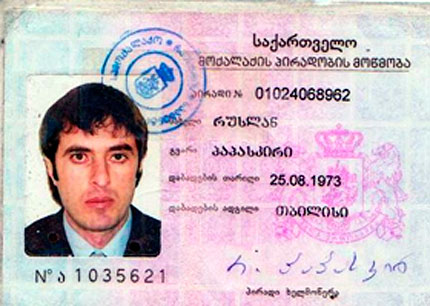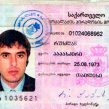
Leaked Video Details the Activities of Russian Hit Squads Abroad
Publication: Eurasia Daily Monitor Volume: 11 Issue: 38
By:

An unexpected breakthrough emerged in the stalled investigations of several mysterious international murders of Chechens with ties to the Caucasus Emirate in 2008–2012. The news concerns a person who simultaneously worked for the security services of several countries—Russia, Georgia and Turkey. A kind of James Bond of Chechen origin, Ruslan Papaskiri (a.k.a. Ali Dabuev), is accused of killing Islam Janbekov on December 11, 2008 (https://www.newsru.com/world/11dec2008/kill.html); Doku Umarov’s representative in Istanbul, Musa Ataev (Mosol), on February 26, 2009 (https://www.daymohk.net/cgi-bin/orsi3/index.cgi?id=36995); three Chechen refugees in the Zeytinburnu district of Istanbul on September 16, 2011 (https://www.turkist.org/2013/01/basayev.html); and several other murders. Papaskiri is also accused of an attempt on the life of Shamsudin Batukaev on October 10, 2011 (https://lenta.ru/news/2011/10/10/batukaev/).
The latest information is especially reliable because it consists of video confirmation provided by the Turkish humanitarian organization Imkander. Over the past several years, this organization has replaced the Humanitarian Relief Foundation (IHH), which had worked on Chechen issues in the past. The Istanbul-based Imkander (https://www.imkander.org.tr/en/?aType=yazarHaber&ArticleID=1) increasingly frequently sponsors actions in defense of Chechens, assists the needy and supplies information about the situation in Chechnya.
On February 21, Turkish prosecutor Ahmet Demirhuyuk asked for three life sentences for Papaskiri and two other people on trial in the Bakirkoy district of Istanbul. The primary suspect was Papaskiri who was tried under the name that was in the passport he had on him when he was arrested—Temur Makhauri (https://www.turkishweekly.net/news/163367/chechens-killed-in-istanbul-in-the-name-of-russian-intel-prosecutor-claims.html). Prosecutor Demirhuyuk further noted that the other two suspects in the case, Alexander Zharkov and Nadim Ayupov, were also Federal Security Service (FSB) servicemen, who had entered Turkey on fake passports. Several other people, members of the same hit squad, were also put on the wanted list.
The most interesting parts of the trial, however, were made public not by the court, but by video recordings that were among the evidence examined by investigators, which the Imkander organization managed to obtain. The leak must have happened with the Turkish authorities’ consent. Acting proactively, the Turkish government may have wanted to prevent the Russian government from denying that the FSB was involved in a series of killings of Chechens in Turkey.
The 52-minute-long video recording that was posted on the Internet features a conversation between ethnic Chechen Umar (Aslan Dakaev), who came from Austria, Temur Makhauri (a.k.a. Ruslan Papaskiri a.k.a. Ali Dabuev) and an FSB middleman, Bashir Kushtov, an ethnic Ingush (https://www.youtube.com/watch?v=32S66YsyI8E). In the conversation, which was in a mixture of two languages, Russian and Chechen, the participants discuss plans to murder two Chechens. Kushtov reassures his counterparts that there would be no problem with money, provided the price is not excessively high. In the end, they agree on 500,000 euros ($683,000) for two killings.
The interesting fact in this conversation is that Kushtov, the FSB middleman, asserts that the security services have three sources in Doku Umarov’s inner circle. Further, Kushtov says that a flash drive they intercepted from an insurgent had information about the underground fighters’ plans to kill Makhauri, who responds with disbelief because he thinks that he enjoys the complete trust of the insurgents. Moreover, it comes out in the conversation that Makhauri maintains good relations with the Antiterrorist Center of Georgia and he thinks they would inform him if he were in any danger.
The men in the video discuss a planned killing in London, but do not mention the name of the target. It could have been Akhmed Zakaev—the pro-independence Chechen leader who resides in the British capital—or perhaps the late Boris Berezovsky. The second killing was scheduled to take place in Egypt and the target may have been Doku Umarov’s brother, who lives there. The video ends at the moment when Bashir Kushtov goes to his hotel room to bring the handgun that is to be used for the murder, while the other two wait for him near the cab.
The Turkish organization Imkander, which released the video, in turn, also held a fascinating press conference. According to its information, Makhauri had the additional task of killing Movladi Udugov, but it is unclear why it did not happen. Moreover, Imkander revealed details (https://www.imkander.org.tr/?aType=haber&ArticleID=428) about the investigation into the death of Shamil Basaev on July 10, 2006 (https://www.rg.ru/sujet/2628/), which was apparently also carried out by Makhauri. According to the investigation, Makhauri prepared the truck with ammunition that exploded and killed Basaev. Interestingly, in that same incident, Isa Kushtov, brother of Bashir Kushtov, the FSB officer mentioned above, was also killed. Isa Kushtov was a hardcore militant. Still, even the possible death of his own brother did not stop Bashir Kushtov from carrying out the operation.
Working for three security agencies for many years, Makhauri managed to avoid suspicion. He even carried out the killing of Doku Umarov’s representative in Turkey, Musa Ataev (Mosol), after spending a week living at Ataev’s home. Ataev apparently could not imagine that he was hosting his own murderer. Photographs of Ataev’s funeral show his killer, Makhauri, present in the first row, among the close friends of the slain man (https://www.radikal.com.tr/turkiye/savcidan_cecen_cinayetleri_davasinda_sok_iddia-1177423).
Thus, Turkey has for the first time incontrovertibly revealed that Russia’s FSB was, indeed, behind the series of killings in Istanbul. Additionally, the revelation underscores that a group of killers in Europe is actively assassinating Russian enemies—a majority of them politically active Chechens in Europe and Turkey.
This clearly illustrates that Russia has not stopped playing by Cold War rules, carrying out espionage and assassinations in Europe and beyond. The killing of the next Chechen outside of Russia is, thus, only a question of time, with little hope that ethics or international law can stop it.




